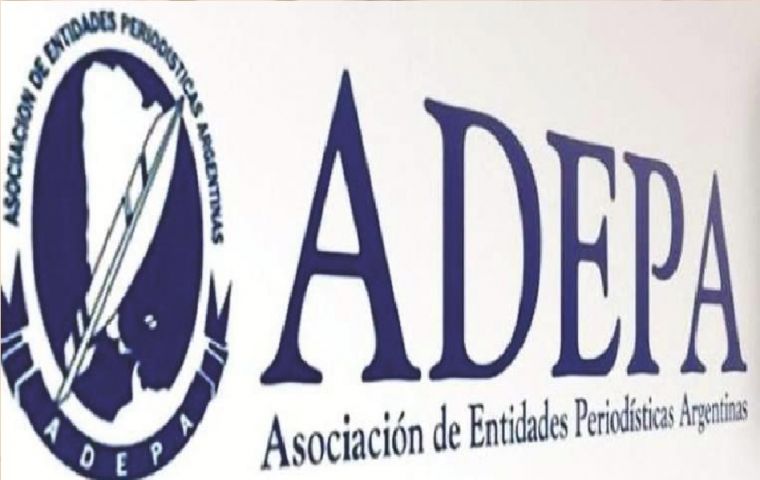MercoPress. South Atlantic News Agency
Argentine press guilds raise their eyes at new attacks on media freedom by Libertarian gov't
 The new guidelines “turn out to be excessively restrictive,” ADEPA warned
The new guidelines “turn out to be excessively restrictive,” ADEPA warned Argentine journalist guilds expressed their concern after the State Intelligence Secretariat (SIDE) targeted reporter Hugo Alconada Mon, and the Libertarian Government of President Javier Milei upped the ante towards the exercise of journalism in Casa Rosada.
ADEPA, FOPEA, and IAPA denounced the attacks, demanded a judicial investigation, and warned against threats to press freedom. In addition, Amnesty International supported Alconada Mon, emphasizing the role of a free press in democratic countries, while ADEPA said that the new Casa Rosada accreditation rules potentially limit journalistic work and access to information.
The Association of Argentine Journalistic Entities (ADEPA), the Argentine Journalism Forum (FOPEA), and the Inter American Press Association (IAPA) expressed their support to Alconada Mon of the newspaper La Nación, after threats and hacking attempts of his electronic devices he suffered at the hands of the SIDE. The guild's document raises worrying ambiguities that open the possibility of surveillance of opponents, journalists, economists, and other social actors critical of the Government.
“ADEPA repudiates the harassment campaign and the attempts of cyber harassment suffered by journalist Hugo Alconada Mon as a result of the publication of an article on a national intelligence program,” the organization said in a statement.
The guilds agreed that these practices violated fundamental principles of the democratic system and demanded that the State guarantee the protection of journalists, their privacy, and their right to investigate.
The new Casa Rosada press rules were interpreted as a “right of admission” by which “the territorial scope of each particular media and the background of specialization of its journalistic coverage, and of the professionals authorized to perform those functions.”
“There is no recollection of a resolution of the same nature. In addition, the government regulates the operational availability of spaces and other documentation presented”, warned ADEPA, who insisted that the new guidelines “turn out to be excessively restrictive if one takes into account the number of professionals currently working in the Casa Rosada.”
“It is easy to understand that, without the possibility of access to discretionary restricted areas or sectors, the journalistic coverage of what happens in the Casa Rosada is greatly affected,” ADEPA added. “Once again, the rigidity of the established regulation ignores the daily life and nature of journalistic work”, the statement said.
“Behind these arguments, which in principle may sound reasonable, there is usually hidden the intention of digitizing access permits in order to reject the entry of critical journalists or those who are not to the government's liking,” ADEPA noted.
FOPEA expressed its “absolute repudiation of the harassment and cyberbullying” suffered by the journalist and warned about “the possible spying on journalists”. It emphasized that the new plan approved by the SIDE contemplates actions that could lead to the monitoring of communicators, seriously affecting the informative work and the right of citizens to be informed.
The SIDE developed a 170-page secret document, to which LA NACION had access and whose authenticity was verified with independent sources, establishing as a focus of interest those who “erode the confidence in the officials” or promote the “distortion of the public perception,” it was reported in Buenos Aires.
The text has been deemed to legitimize internal intelligence actions against voices critical of the national government, including journalists, economists, and users of social networks, who generate “loss of confidence” in the economic policies of the Executive. This ambiguous wording has generated strong concern in the journalistic and academic circles, given the international precedent of similar plans used to justify the surveillance of opponents.




Top Comments
Disclaimer & comment rulesCommenting for this story is now closed.
If you have a Facebook account, become a fan and comment on our Facebook Page!